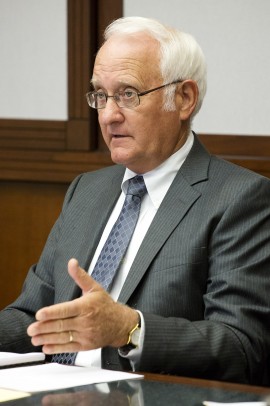Faculty participation is ‘fundamental,’ university president says

Bob Easter: The role of university administration is to facilitate intercampus relationships, not mold each campus to fit a single identity. Photo: L. Brian Stauffer
Faculty participation in university governance is “fundamental to our long-term success,” University President Bob Easter told UIC faculty members Thursday at the UIC Senate meeting.
Easter shared his vision for the university, from university centralization and budgeting to pension changes and tuition increases.
As president, Easter said, his role doesn’t include significant involvement in campus management — that’s the job of campus administrators.
“I view my role in an accountability fashion to the Board of Trustees,” Easter said.
“I see my role, in a very significant part, as being the representation with the legislature, civic, corporate government and other leaders, to assert the importance of the University of Illinois and its three campuses in the preparation of a world-class workforce for the state of Illinois.”
The role of university administration is to facilitate intercampus relationships rather than mold each campus to fit a single identity, Easter said.
“Should each campus march to the beat of a single drum? No,” he said.
“Each one of our three great campuses has a unique history, a unique culture and a very distinctive mission within the world that it serves.
“My goal isn’t to mandate intercampus relationships. They have to be based on shared faculty interest and goals.”
Still, “there are areas where greater efficiency and economy is achieved by a centralized organization,” Easter said, such as purchasing, legal services and accounting.
“But there are other areas that it’s much more efficient to deal with locally. I don’t intend to make any decisions in isolation.”
Seven committees that include administrators and faculty members from each campus will review areas where the university can reduce redundancy and improve efficiency, Easter said. Their reports are expected in March.
Fiscal outlook
As of last week, the state owes the university a combined $446 million from fiscal year 2012, which ended June 30, and the current year, Easter said.
“I’m not a doomsday person, but I’m a realist and the state is in a very difficult position,” he said.
Easter and other university administrators are meeting with state legislators to address the budget shortfall.
“I told them that we’re at a point where I don’t think we can either practically or ethically increase tuition much beyond the rate of inflation,” Easter said. “The more we increase tuition, the more that we make it unaffordable and make ourselves inaccessible.”
Discussions with state legislators about changes to the state pension system indicate that, while no decisions have been made, it’s likely the university may take on a “significant part of the costs of providing pensions,” he said.
“How much? I don’t know. But any way you look at it, it adds a complication to our already strained budget and it means that the measures we’re taking to increase efficiency and economy are really important.”
